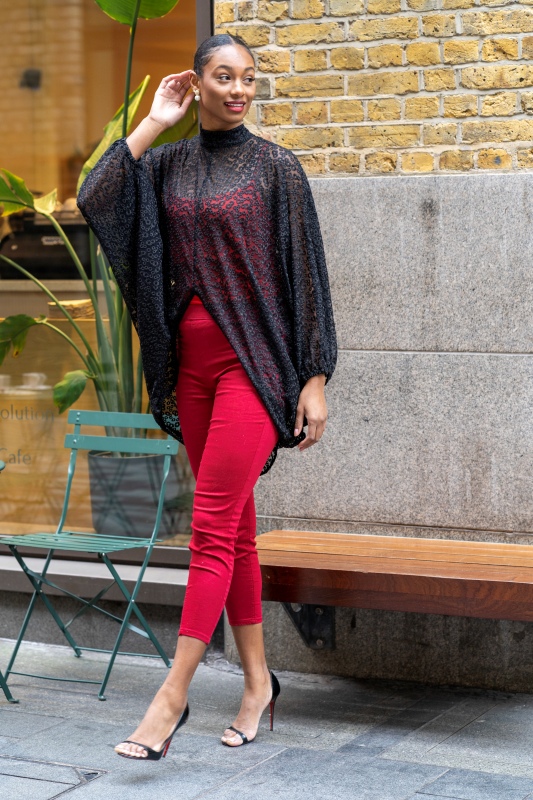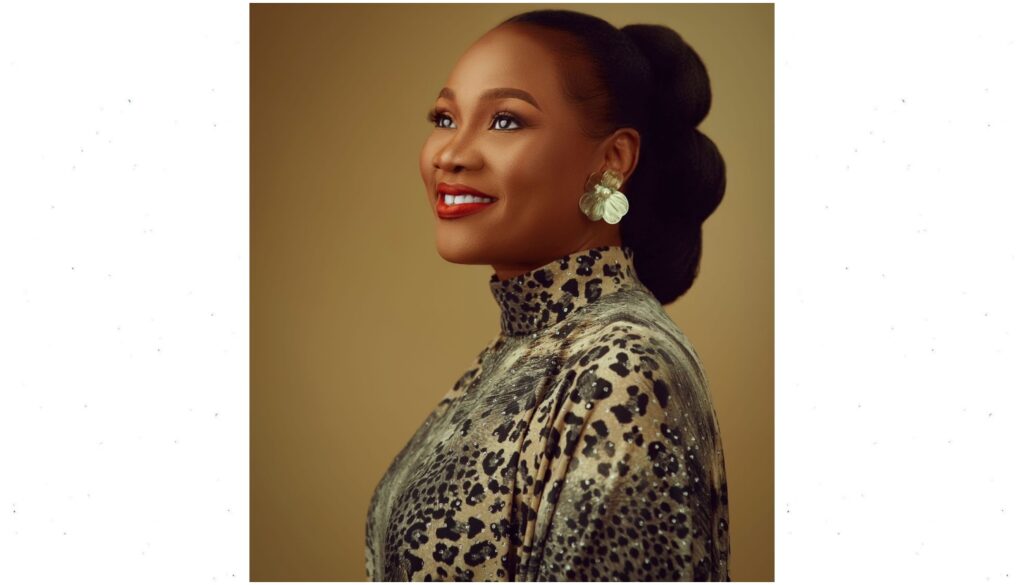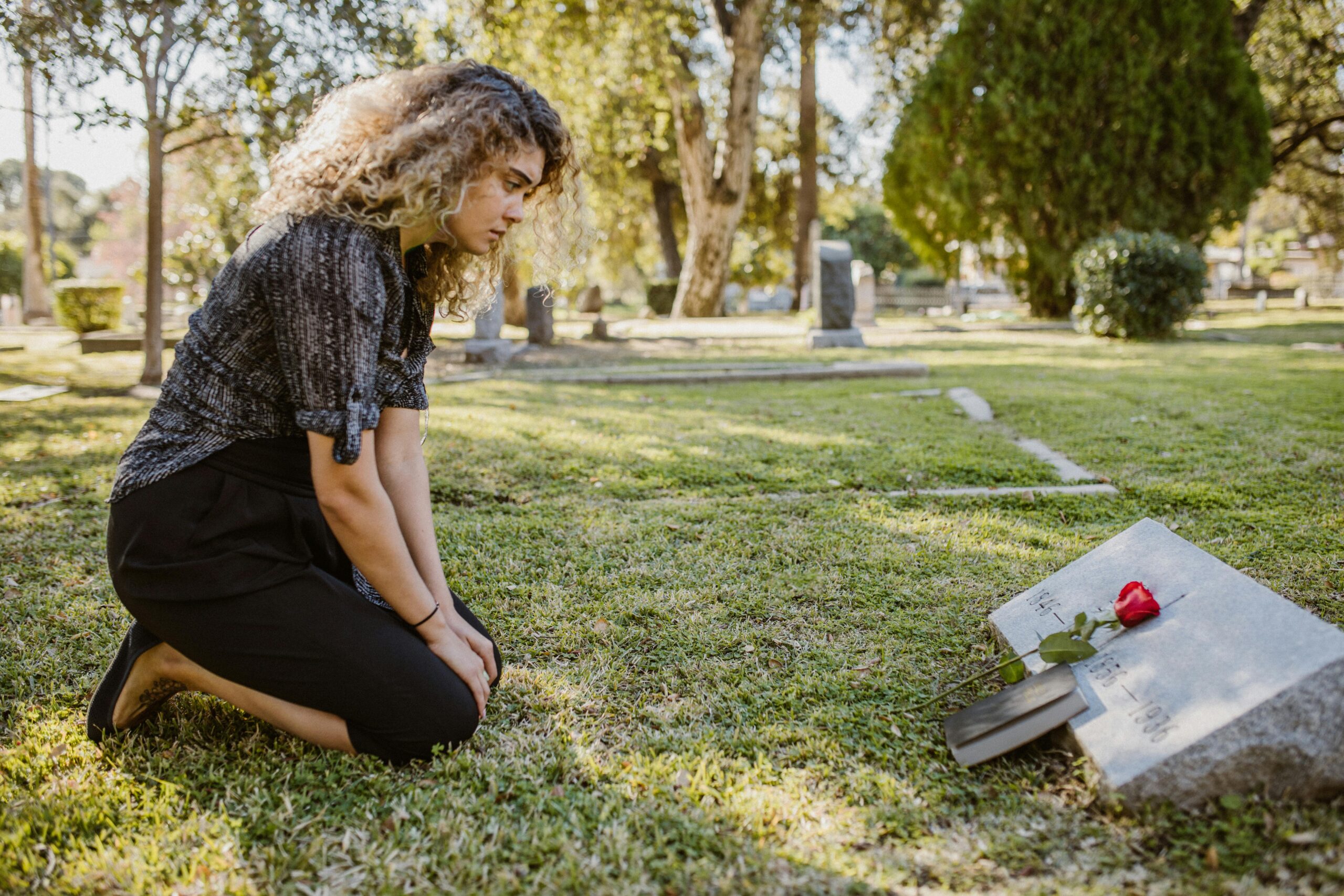Meet Tokunbo Fasoro, a girl who was deeply in love with fashion and captivated by her mother’s impeccable style. She always saw her mother as a fashion icon in her own right, and this inspiration led her to become a great fashion designer. Tokunbo is a certified Global HR Professional, Award-winning Business Coach, Speaker, Fashion Entrepreneur, and Author. She turned her passion into a side business during her university days, demonstrating her early commitment to fashion.
Despite personal struggles with self-esteem, Tokunbo supported her mother’s fabric business and seamlessly balanced her passion for fashion with a successful 15-year career in HR. In 2018, she started Zito Gems, a fabric and jewelry company, with her then-assistant Zika Nwise. By 2021, she had pivoted the brand and launched Clara’s Signature in Nigeria, a ready-to-wear brand. This was followed by the launch of Lioness by TF in the UK.
Lioness by TF is renowned for its fresh design style, iconic fabrics, and exceptional quality, making luxury fashion accessible to a global audience. Tokunbo’s book, ‘The Persistent Woman: Overcoming 20 Years of Rejection,’ details her relentless journey in building a career and overcoming the difficult road to entrepreneurship. It highlights how she broke through limitations with persistence, resilience, and grit to become the accomplished woman she is today.
We are very grateful to have Tokunbo Fasoro with us today. Her journey is an inspiration to many. Let’s embark on this exciting journey and get ready to be inspired as Tokunbo shares her wisdom with us!
1. Today, you are working with a lot of people and helping women through work and experience. How did you overcome the low self-esteem and rejection you faced in your early years? Share the sole approach behind it
A pivotal moment in my life was meeting someone who saw greatness in me, even when I couldn’t see it myself. This individual challenged my negative self-talk and constantly reminded me of my potential. Surrounding myself with positive influences and mentors was crucial. I deliberately changed my circle of influence, both in person and on social media, to include only those who inspired and uplifted me. This shift in my environment helped me realize that I could succeed just like those I admired.
Helping other women has always been deeply personal for me. My past experiences of pain and struggle made me acutely aware of how many women live their lives merely existing and surviving. I knew that every woman is unique in her own special way and has a place in this world, much like a piece of a puzzle that needs to be owned and celebrated. I made it my mission to inspire women to break out of their limitations, understand that they are “made for more,” and guide them toward achieving their dreams.
Today, I help women identify their innate abilities and turn them into profitable ventures. I currently mentor three fashion designers here in the UK: Ishas Timeless, Eko in Manchester, and Anuora. Through sharing my experiences and offering guidance, I support them in their journey towards achieving their dreams.
2. How did you balance your studies with your side fashion business during university? Share some advice to follow and things to avoid.
Balancing my studies with a side fashion business during university required passion, delegation, and strategic planning. I never saw designing and creating as work because I was so passionate about it. I spent most of my free time working on my designs and would stop at the market every weekend to buy materials.
One strategy that worked well for me was hiring other students as salespeople on commission. I offered generous commissions, so they were always happy to sell my products in their various faculties. This allowed me to focus solely on designing and creating. Additionally, my roommate helped with some of the work, and we both enjoyed the financial benefits.
My advice for anyone trying to build a business while managing other responsibilities is to delegate effectively. It’s okay to share your profits to maintain a balanced life rather than being overwhelmed and risking failure because you don’t want to share. Also, pay for your weaknesses and focus on your strengths. By doing this, you can ensure that your business thrives without compromising your other commitments.

3. Your transition from a 15-year career in HR to a fashion entrepreneur is really amazing. How did you utilize your HR career for your success in the fashion industry?
In HR, I learned the importance of first impressions—people address you properly and listen to you when you’re well-dressed. This principle holds true in the fashion industry, where making a great first impression is crucial. Fashion is a powerful business tool that opened doors, for me in my HR career
I loved my HR career, particularly the human capital development aspect. However, to build the global brand I had always desired as a child, inspired by iconic luxury brands, I realized I needed to spend more time creating and building this dream. I incorporated my HR skills into my fashion business by mentoring aspiring designers and organizing events and product launches with panel talks to inspire women in fashion and lifestyle.
In this way, I still feel like an HR professional, but now within the fashion industry. By blending my HR expertise with my passion for fashion, I’ve created a brand that not only focuses on style but also on empowering and developing others in the industry. This approach allows me to pursue my childhood dream of creating a global luxury brand while leveraging my HR background to support and inspire others.
4. Apart from your mother, your childhood inspiration and icon, was there someone whom you followed later when you started your business?
Absolutely. While my mother was my initial inspiration, as I delved deeper into the fashion industry, I found myself greatly influenced by Michael Kors. His impeccable style and unwavering commitment to quality production resonated with me. Kors’ ability to blend timeless elegance with modern trends served as a blueprint for my own designs. His journey and success story were incredibly motivating, reinforcing my belief that I could also build a global brand that marries quality with style.
5. How hard was it to finance your business in the starting stage, and what financial strategies were really crucial in funding your business growth from a side business to a flourishing brand?
Financing my business in the beginning was very challenging. The biggest hurdle in starting Lioness by TF was securing funding and managing the high operational costs in the United Kingdom. Expenses for materials, manufacturing, and logistics were significantly higher than in Nigeria, making it difficult to scale the business while maintaining quality and affordability.
To overcome these financial challenges, I relied heavily on my husband’s savings and investments. Additionally, I took out a business loan to help scale the business. These funds were crucial in covering the initial costs and allowed me to focus on growing the brand. Despite the financial strain, I remain committed to my vision and continuously seek innovative solutions and strategic partnerships to sustain and expand Lioness by TF.
6. Can you share an example of a significant business risk you’ve faced earlier, and how you compete with other brands in the market with your brand’s unique identity?
One of the most significant risks I faced earlier in my business journey was choosing to manufacture in England, despite discouragement from many advisors. It was a bold decision driven by my determination and vision for Lioness by TF. Manufacturing in England posed financial challenges, but I believed in the quality and prestige associated with British craftsmanship.
To differentiate my brand from others in the market, I leverage my unique identity rooted in my rich Nigerian heritage. My collections blend flamboyant colors and textures with modern styles, inspired by nature, wildlife, and the strength of the lioness. These elements not only resonate with my personal inspirations but also embody empowerment and resilience, themes that drive my creative process.
7. Apart from the percentage and support that goes to community initiatives, what other strategies or factors do you believe are crucial for running your fashion brand successfully over the long term?
Beyond our commitment to community support, several key factors are crucial for the long-term success of Lioness by TF. First, our dedication to quality and craftsmanship ensures each piece reflects durability, elegance, and meticulous attention to detail, attracting discerning customers.
Innovation and design are also vital. Staying ahead of fashion trends and introducing new, unique designs inspired by Nigerian heritage and global influences keeps the brand fresh and appealing. Equally important is our brand identity and storytelling. Connecting emotionally by highlighting empowerment, resilience, and cultural heritage fosters loyalty and attracts customers who resonate with our values.
Furthermore, sustainability is integral. Prioritizing ethical practices in sourcing and manufacturing aligns with ethical consumerism and meets environmental expectations. Lastly, strategic partnerships with like-minded brands and influencers enhance reach and visibility, opening new market opportunities and amplifying our message. By focusing on these strategies alongside community initiatives, Lioness by TF is positioned to thrive in the fashion industry for years to come.
Feature Image Credit: Alara Imagery







